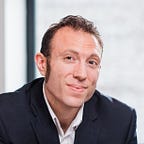The year you finally get it right.
The recently departed Rabbi Jonathan Sacks’s quote, “Jews do not have a monopoly on wisdom.” reminds us that there are many sources beyond the Torah, that directly support Jew’s sacred responsibility, to Tikkun Olam, our work to repair the world.
This week’s portion extends from the end of the Torah (Deuteronomy) to the beginning of the Torah (Genesis). Moses ascends to heaven in the final lines of the Torah, and God tells us that we will never experience Moses again.
We then immediately begin a new cycle of the Torah, starting with the story of creation from the beginning of Genesis, which eventually leads to the same inevitable conclusion. The fact that the Torah ends with God saying that we’ll never experience Moses again, even as we then begin the exact same story, tells us that each moment, each experience, and each interpretation is unique.
Henry David Thoreau said, “Things do not change; we change.” While each year we return to the same verses, it is we who are different. With each passing year, we celebrate and mourn and grow and change. And the new person we have become is reading these words and hearing this story for the very first time.
Heraclitus said, “You cannot step into the same river twice.” We will perceive Moses and the Torah differently each time because we will be different each time.
Thich Nhat Hanh said, “It is not impermanence that makes us suffer. What makes us suffer is wanting things to be permanent when they are not.” Each year we can mourn the loss of our former younger selves or celebrate our new growth and wisdom, but change will come whether we make peace with change or war with change.
As we transition from the end to the beginning of the Torah, we go through a continuous series of growth and loss, paralleling the birth and loss of Moses and the start and finish of the Torah itself.
This structure, flowing from the end to the beginning, reminds us, in the wise words of our very own Pittsburgh native Mister Rogers, “When you think you’re at the end of something, you’re at the beginning of something else.”
God creates the world and Adam and Eve in the garden of Eden. Beginning.
They are tempted by the snake, eat the apple of knowledge, and leave the garden of Eden. End.
They have two sons. Beginning.
One’s named Cain and kills his brother Abel. End.
Adam and Eve have another son named Seth, who leads ten generations going down to Noah. Beginning.
God regrets having created humans and decides to destroy everything on Earth. End.
Noah builds an ark, so after the flood, animals and humanity get a fresh beginning. And so, the cycle goes on forever.
Martin Luther King Jr. said that “Faith is taking the first step even when you can’t see the whole staircase.” You do not know what challenges or lessons lie ahead, but you recognize that you will grow as you go.
You know that each time you confront the same story and the same challenges in your own lives, it’s a new experience, being made by a new, wiser you who has worked and grown beyond the limitations of your former self.
Maya Angelou reminds us, “We delight in the beauty of the butterfly, but rarely admit the changes it has gone through to achieve that beauty.” Our caterpillar cocoon mistakes are valuable for the lessons they teach us to transform into our butterfly best selves.
No matter how many times you’ve gotten it wrong, the person you are at this very moment has never tried before. With a new you and a clean slate, this can be the year you finally get it right.
